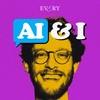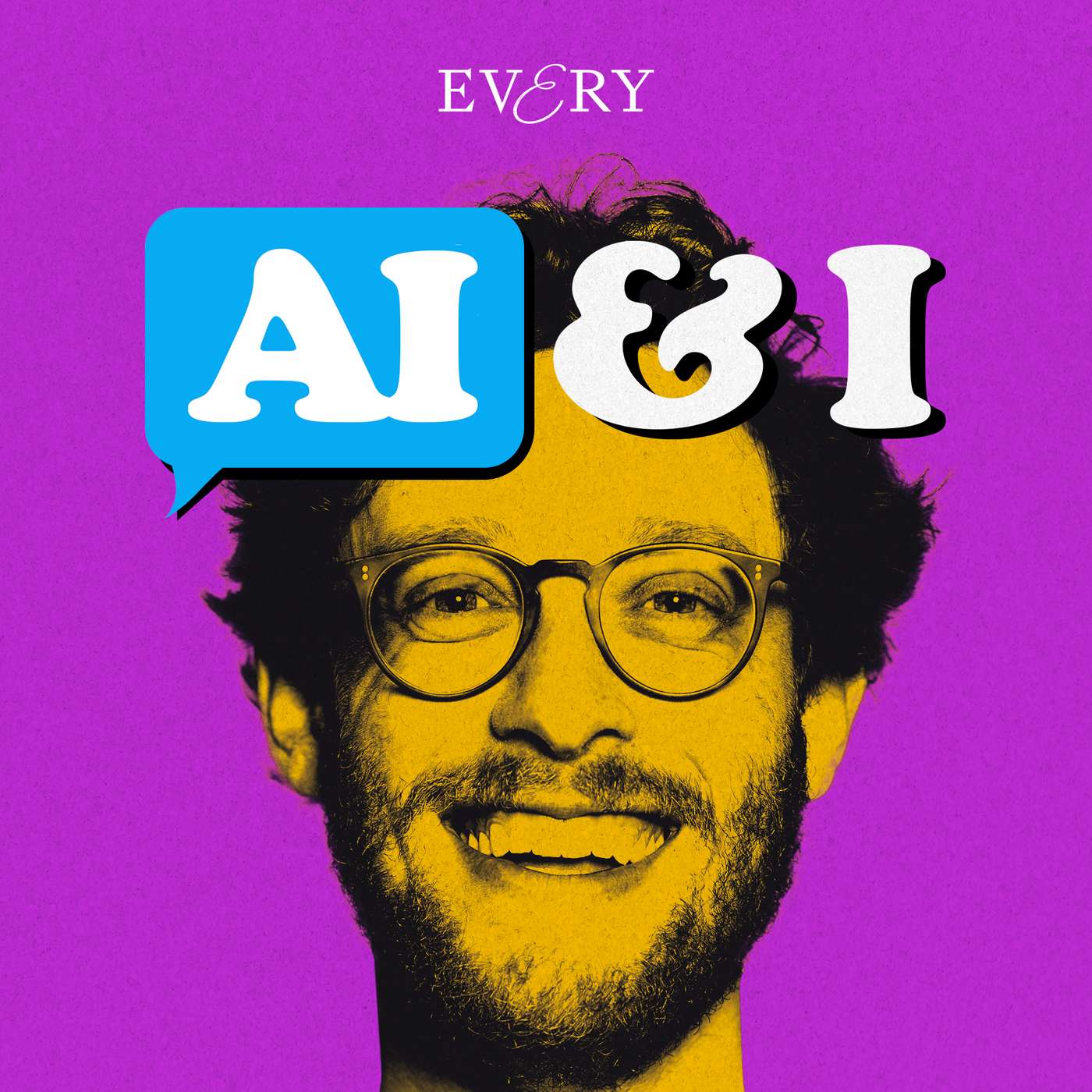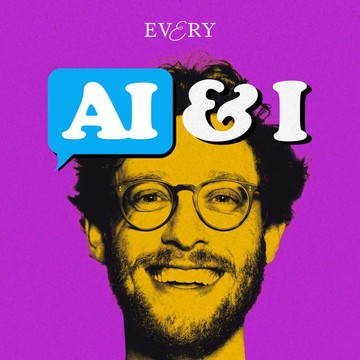

AI & I
Dan Shipper
Learn how the smartest people in the world are using AI to think, create, and relate. Each week I interview founders, filmmakers, writers, investors, and others about how they use AI tools like ChatGPT, Claude, and Midjourney in their work and in their lives. We screen-share through their historical chats and then experiment with AI live on the show. Join us to discover how AI is changing how we think about our world—and ourselves.
For more essays, interviews, and experiments at the forefront of AI: https://every.to/chain-of-thought?sort=newest.
For more essays, interviews, and experiments at the forefront of AI: https://every.to/chain-of-thought?sort=newest.
Episodes
Mentioned books

550 snips
Oct 22, 2025 • 1h 8min
Spiral: Designing an AI Ghostwriter With Taste
Danny Aziz, the general manager of Spiral and a creative craftsman, shares insights on transforming AI writing tools. He discusses how the redesigned Spiral enhances editorial taste and encourages intentional writing. Danny emphasizes the importance of slowing down to improve AI-generated content quality. He also highlights the power of multi-agent workflows and the philosophy that good writing stems from deep thinking. Ultimately, he argues for using AI as a partner without compromising craftsmanship.

351 snips
Oct 15, 2025 • 58min
We Taught AI to Play Games—Now It’s a $3.6 Million Company
Join Alex Duffy, the Head of AI Training and brains behind Good Start Labs, as he discusses the innovative role of games in training AI models. He reflects on lessons learned from games like RuneScape and reveals why traditional testing benchmarks are outdated. By using games like Diplomacy, Alex showcases how AI can develop negotiation skills and strategic thinking. He also shares insights on the future of AI in fields like education and life sciences, emphasizing how gaming can demystify AI for the public.

874 snips
Oct 8, 2025 • 53min
Box CEO Aaron Levie on Why AI Agents Won’t Take Your Job
Aaron Levie, CEO of Box, shares insights from his 20 years in tech leadership, emphasizing that AI agents will augment rather than replace human jobs. He explains how productivity gains lead to new opportunities, a concept he ties to Jevons Paradox. Drawing parallels with earlier tech revolutions, Levie discusses transforming workflows and the role of knowledge workers as managers of AI. He emphasizes the importance of creating an AI-first culture and explains the balance between tackling immediate issues and innovating for the future.

681 snips
Oct 1, 2025 • 52min
MCP Servers: Teaching AI to Use the Internet Like Humans
Alex Rattray, Founder and CEO of Stainless, delves into the intricate world of MCP servers and their role in connecting AI to the internet. He explains the importance of designing effective APIs, highlighting the balance between having too many tools and not enough. Alex shares a practical example of handling refunds across multiple platforms, illustrating the complexities involved. He also discusses the future of AI incorporating code execution, leading to a cyborg-like interaction. Tune in for a fascinating exploration of AI and cutting-edge tech!

545 snips
Sep 24, 2025 • 53min
Cognition’s CEO on What Comes After Code
Scott Wu, co-founder and CEO of Cognition, shares insights as the mind behind Devin, the world's first autonomous AI coding agent. He discusses the profound impact of AI on software engineering and why fundamentals of computer science remain crucial. Scott boldly suggests we may already be experiencing AGI milestones. He explores evolving programming workflows and the role of reinforcement learning in developing smarter coding agents, plus his vision for personal AI assistants to tackle everyday tasks.

339 snips
Sep 17, 2025 • 57min
One Developer Got Thousands of Users Before His App Launched
Naveen Naidu, an entrepreneur and solo engineer at Every, shares his unique journey in developing Monologue, an innovative voice-to-text dictation app. He reveals how he built a massive user following before the app even launched, thanks to intensive dogfooding and valuable feedback. Naveen discusses the evolution of Monologue from early side projects, the challenge of launching in a crowded market, and his one-man AI development toolkit. Listen in for insights on finding product-market fit and the strategies that propelled his success.

1,887 snips
Sep 10, 2025 • 1h 12min
Claude Code Can Be Your Second Brain
Noah Brier, the mastermind behind Alephic and BRXND.AI, shares his innovative use of Claude Code as a second brain. He reveals his impressive setup, running Claude on a home server linked to his Obsidian vault. Noah emphasizes AI's reading capabilities, showcasing how it aids in research and project management. He discusses the seamless integration between Claude and Obsidian for efficient note-taking and highlights the profound impact this tech has on his productivity. Tune in for a glimpse into the future of work and AI!

232 snips
Sep 3, 2025 • 1h 5min
This AI Makes a Video Game World in 40 Milliseconds
Dean Leitersdorf, co-founder and CEO of Decart, showcases Mirage, an innovative tech that transforms live video feeds into stunning real-time graphics in just 40 milliseconds. He envisions a future where game development becomes incredibly accessible, allowing rapid creation of unique aesthetics. The conversation dives into the philosophical aspects of AI's role in gaming and creativity, the challenges of generating coherent video sequences, and how AI might revolutionize workplace creativity, enabling humans to reclaim time for introspection.

333 snips
Aug 27, 2025 • 1h 10min
Best of the Pod: How to Prepare for AGI According to Reid Hoffman
Reid Hoffman, the cofounder of LinkedIn and a partner at Greylock Partners, shares insights on preparing for the impending era of AGI. He discusses how historical fears about new technologies often overlook their potential to enhance human agency. Reid emphasizes the importance of adaptability and an experimental mindset in navigating technological uncertainty. He also explores the evolving job market and advocates for democratized access to AI tools, suggesting that as we embrace AGI, we can shape a more human-centric future.

434 snips
Aug 20, 2025 • 1h 7min
Best of the Pod: She Built an AI Product Manager Bringing in Six Figures—As A Side Hustle
Claire Vo, Chief Product Officer at LaunchDarkly and founder of ChatPRD, shares her journey of creating an AI tool that simplifies product management while balancing a demanding job. Discover how she built ChatPRD during a Thanksgiving weekend, the future of product management roles, and the ways AI facilitates rapid upskilling for junior PMs. Claire also discusses the integration of AI in her daily life as a tech-forward parent and how this side hustle not only supports 10,000 users but enhances her own professional skills.


